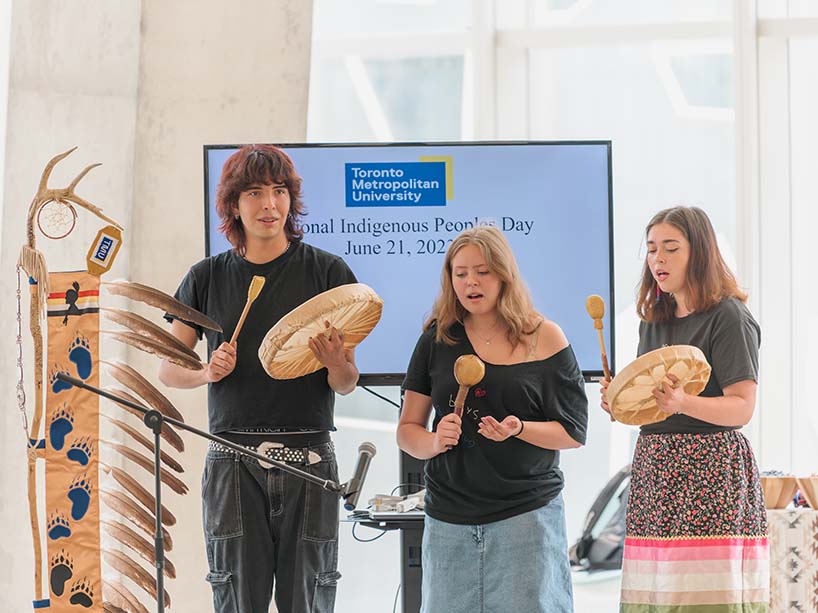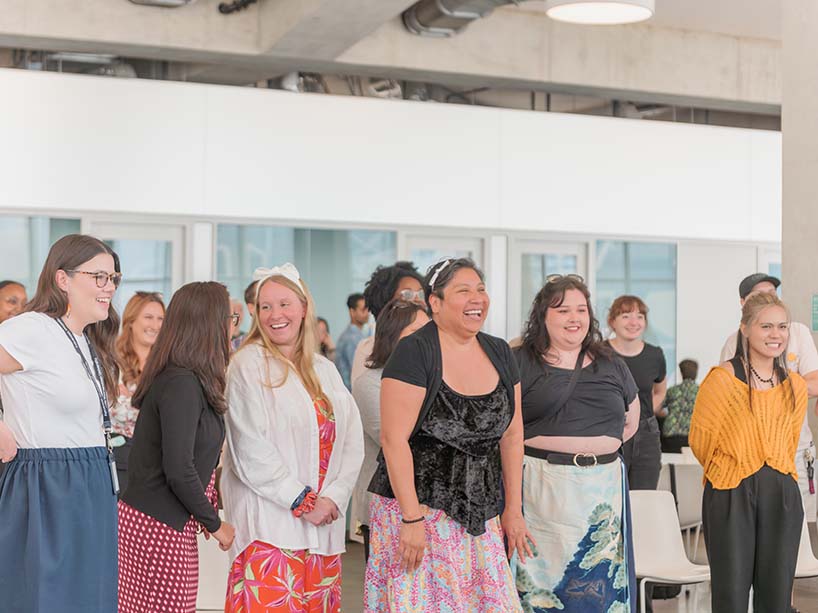How public attitudes toward reconciliation are shifting

Michael Etherington, left, and a guest, display a wampum belt at a National Indigenous Peoples Day event at TMU. Research shows that both Indigenous and non-Indigenous people have a better understanding of the harm government policies have caused to Indigenous Peoples, but more engagement is needed between Indigenous and non-Indigenous communities to foster collective action. Photo by Alyssa K. Faoro.
Do people really understand the harm that government policies have caused to Indigenous Peoples? Do they think that enough action has been taken to acknowledge those harms, take responsibility and build the strong relationships needed to move towards reconciliation?
The Canadian Reconciliation Barometer (external link) measures progress of non-Indigenous and Indigenous peoples’ shared journey towards reconciliation. The project’s second annual report was published last month, which shows an increase in awareness and understanding of the harms caused by government policies such as Residential Schools. At the same time, it reveals that non-Indigenous people still aren’t engaging with Indigenous communities and more work needs to be done to foster collective action.
“Indigenous people live in a different Canada than non-Indigenous people – they experience things really differently, including systemic and structural inequities, as well as personal inequities,” said Iloradanon Efimoff, psychology professor at TMU and member of the research team at the Canadian Reconciliation Barometer.
“It's easy to think that we're making progress towards reconciliation. But without rigorously tracking perceptions and progress towards reconciliation, we have no baseline and we can't tell what direction we're headed in. Measuring progress is important for us to know that we are still progressing forward, so that we can identify areas that we're doing well in, areas that we need to keep working on, or areas that we're actually falling back on.”

Indigenous youth from the 2-Spirited People of the 1st Nations drum group perform a set of songs using traditional hand drums and a shaker at TMU. In 2022, Indigenous people didn’t think Canada is making progress on apologies, respect for the natural world, Indigenous thriving, systemic equality, representation and leadership, nation-to-nation relationships, and personal equality. Photo by Alyssa K. Faoro.
Signs of progress
The latest report shows public perception of 13 indicators of progress made in 2022. The data is based on nationally representative survey responses of 1,034 Indigenous and 2,140 non-Indigenous people in six regions across Canada.
One of the key findings was that 90 per cent of non-Indigenous respondents and 94 per cent of Indigenous respondents had previously read or heard about Residential Schools, up from 65 per cent and 87 per cent in 2021.
“There's been an increase in the perception of harm perpetrated against Indigenous people. A few different things probably contributed to that, but one of them might be the finding of unmarked graves at residential school sites across the country,” Efimoff said. “There were a lot of headlines that summer that could lead to public awareness. People became aware of the extent of harm that happened at Residential Schools. After learning that children died at the schools and were not returned home to their families, it's hard to not acknowledge and perceive that harm.”
Another factor that Efimoff highlighted as a possible reason behind the increased perception of harm was the Pope's apology in July 2022, on behalf of the Catholic Church for its role in the Residential School system.
The research also found that non-Indigenous respondents now feel as strongly as Indigenous respondents do that the natural world is not being adequately protected. In terms of priority areas for reconciliation efforts, Indigenous people don’t think Canada is making enough progress on apologies, respect for the natural world, Indigenous thriving, systemic equality, representation and leadership, nation-to-nation relationships and personal equality.

As non-Indigenous people’s perceptions of reconciliation become more aligned with Indigenous peoples’ views, greater support can be garnered for government action on Indigenous issues. Pictured, the TMU community came to learn and celebrate Indigenous history and culture on National Indigenous Peoples Day. Photo by Alyssa K. Faoro.
Building meaningful relationships to sustain progress
Another key finding is that non-Indigenous respondents were less confident in 2022 than in 2021 that interpersonal relationships between Indigenous and non-Indigenous people are mutually respectful, bringing non-Indigenous views in line with how Indigenous people see those relationships. Still, this awareness has not spurred non-Indigenous respondents to engage with Indigenous causes and communities.
“When I think about how we can close this gap, and how we can get non-Indigenous folks to get engaged with Indigenous causes and communities, there's a lot that can be done, such as creating opportunities for engagement,” said Efimoff. “Lots of non-Indigenous people might not personally know an Indigenous person and those types of close relationships can have impacts on these types of outcomes.”
“A lot of non-Indigenous people might not know what their role is in reconciliation, or what their role is when it comes to engaging with Indigenous causes. Many people perceive reconciliation as an Indigenous issue, but it's not, it’s a Canadian issue. So, part of increasing engagement might be increasing an understanding of the appropriate role of non-Indigenous people in Indigenous causes and events and with reconciliation.”
Mutual understanding can steer action and accountability
Overall, the findings of the report suggest that non-Indigenous respondents’ views have become more aligned with Indigenous respondents’ views. This increased agreement can lead to more support for government action on Indigenous issues.
“If we can get people to have the same perception of reconciliation, then we can ensure that we're all starting from the same place; we all have the same idea in mind of the work that needs to be done so we can more easily work together to make changes happen,” said Efimoff.
Efimoff also emphasized that the Canadian Reconciliation Barometer is just one of many ways to measure reconciliation. “It’s one of the tools in the toolbox that can be used to gauge our progress as a society towards reconciliation. We must continue to track our progress, seek transparency and accountability, and use research to take informed action.”